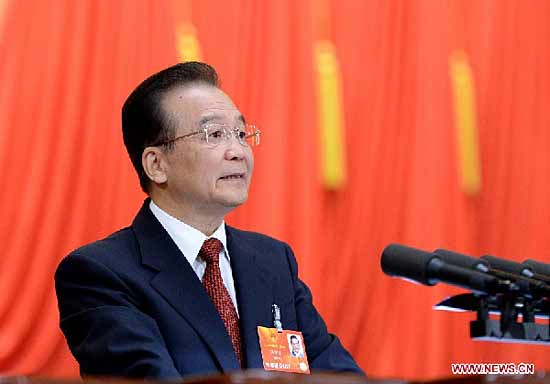

 Latest News|Photo & Video|NPC News|CPPCC News|Commentaries|China Politics
Latest News|Photo & Video|NPC News|CPPCC News|Commentaries|China Politics |
| Chinese Premier Wen Jiabao delivers the government work report during the opening meeting of the first session of the 12th National People's Congress (NPC) at the Great Hall of the People in Beijing, capital of China, March 5, 2013. (Xinhua/Liu Jiansheng) |
BEIJING, March 5 (Xinhua) -- Chinese Premier Wen Jiabao on Tuesday advised his succeeding government to "unswervingly"take expanding domestic demand as the government's long-term strategy for economic development, given the "fundamental" role of consumption and the "key" role of investment in driving economic growth.
In his last delivery of government work report as China's premier, Wen said he made his suggestions based on an understanding of the work of the past ten years, especially of the past five years.
"The difficulty in and key to expanding domestic demand lie in consumption, and that is also where the potential lies," Wen told nearly 3,000 national legislators at the annual session of the 12th National People's Congress (NPC).
Consumption has become China's primary driving force for economic growth, contributing to about 51.8 percent of China's gross domestic product growth last year, while fixed-asset investment helped drive another 50.4 percent of the GDP growth, according to data from the National Bureau of Statistics (NBS).
Export, which is considered another key economic engine, contributed to a minus 2.2 percent last year, the NBS data showed.
However, retail sales of consumer goods equaled to only 21 percent in China's 51.9-trillion-yuan GDP last year, compared with about 72 percent for investment.
To expand individual consumption, Wen said, the government should enhance people's ability to consume, keep their consumption expectations stable, boost their desire to consume, improve the consumption environment and make economic growth more consumption-driven.
The government expected retail sales of consumer goods to increase by 14.5 percent in 2013, compared with 14.3 percent recorded last year, according to a report on the implementation of 2012 plan and the draft plan for 2013 submitted Tuesday to the NPC by the National Development and Reform Commission (NDRC), China's top economic planner.
The NDRC's draft plan promised to raise the income of low- and middle-income groups, set up a sound mechanism for regularly increasing workers' wages, raise farmers' income and improve the social security system that covers both urban and rural residents.
In the meantime, Wen also emphasized that the role investment plays in promoting economic growth "cannot be underestimated" in the current stage, noting China has both investment capability and investment demand.
"But the key is to make investment in the needed sectors, optimize the structure of investment, and improve its performance and returns," Wen said.
An 18-percent increase in fixed-asset investment is expected in 2013 by the government.
"Governmental investment is important in guiding nongovernmental investment, but its share of the country's total investment is decreasing, so we must further relax controls over market access for nongovernmental investment and stimulate it," he added.